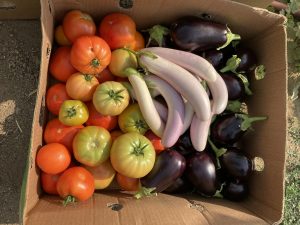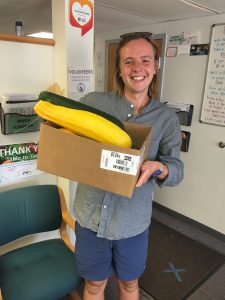Food Waste, Climate Change, and You: An Introduction

What happens when you toss that old banana in the trash?
A recent United Nations report found that 930 million tons of food are wasted at homes, stores, and restaurants each year. If farms and production facilities are also considered, more than a third of food is wasted each year worldwide. These statistics demonstrate that food waste is a big problem, but visualizing how big the problem can be challenging. I’ve never seen a million pounds of food, let alone 930 million tons of food! If we can’t visualize the problem, it is difficult to understand the impacts, let alone imagine solutions.
I have the privilege of having a curbside compost cart through the city of Iowa City, so the organic materials we can’t or don’t use usually find their way into the compost cart. At the most immediate level, I compost and work to reduce food waste for selfish reasons. By tossing banana peels, bones, and veggie scraps into the compost my trash can doesn’t smell (and it’s less enticing to my dog). Although throwing my organic materials in the trash instead of the compost probably won’t impact me the next day, the next year, or even in the next decade, it will impact other communities, today, tomorrow, and into the future. Whether it be next month or the next century, the actions we make today will dictate the livelihoods of communities today and those of future generations.
The inputs to grow, transport, and prepare food are immense. By being conscious about our role in the food waste machine, we can celebrate the gift that is food and give thanks to those that are helping nourish us.
The good, wholesome food that Table to Table volunteers rescue avoids a needless fate in the compost pile, or, more likely, the landfill. When organic materials are taken to the landfill they break down in an environment with little oxygen. This process produces the greenhouse gas methane. Pound for pound, methane adds to the climate change problem even more than its famous cousin carbon dioxide. Organic materials make up about 35% of the Iowa City Landfill and account for roughly 2% of the city’s greenhouse gas emissions. Organic materials are being sent to landfills across the world. The greenhouse gases emitted from food waste in the U.S. have a larger impact than the airline industry. If we can’t eat all of our food, we should try our best to compost it.
 I started writing this post hoping to get down to the nitty-gritty of how Table to Table impacts our local environment. Luckily for me somebody already did all the hard work (thank students at the University of Iowa!). Their project compared the inputs of greenhouse gases (our vehicle emissions) and the mitigation of greenhouse gases (the greenhouse gas emissions avoided because food was not taken to the landfill). Their research and calculations demonstrate: “Table to Table has a net-positive environmental impact for greenhouse gas emissions.” At the most basic level, this means that our food rescue program makes a difference in the fight against climate change.
I started writing this post hoping to get down to the nitty-gritty of how Table to Table impacts our local environment. Luckily for me somebody already did all the hard work (thank students at the University of Iowa!). Their project compared the inputs of greenhouse gases (our vehicle emissions) and the mitigation of greenhouse gases (the greenhouse gas emissions avoided because food was not taken to the landfill). Their research and calculations demonstrate: “Table to Table has a net-positive environmental impact for greenhouse gas emissions.” At the most basic level, this means that our food rescue program makes a difference in the fight against climate change.
The challenge of food waste can be overwhelming and even more so when we think about its impact on the environment. It is hard to comprehend methane and carbon dioxide levels, or the pollutants in our tailpipes, or the water and land used to grow our food. However, what is easy to understand is that we can do something! When I am feeling overwhelmed about food waste, I have to remind myself that humans have been coming up with ideas to reduce food waste and compost extra food for millennia. Making soup stock with veggie scraps and bones reduces food waste. Making goulash reduces food waste, and so does cooking beef bourguignon. We already know many ways to reduce our food waste, and we have the opportunity to adopt new ways to reduce waste while also feeding ourselves and our communities. When we think about reducing food waste as building connections between abundance and hunger, we can make progress.
-Ezra Schley, Food Rescue Program Coordinator

